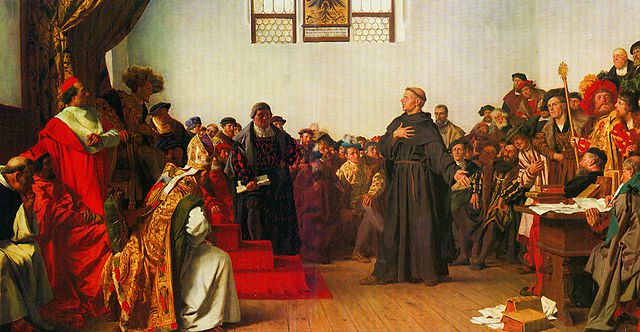
Luther at the Diet of Worms (1877), by Anton von Werner (1843-1915) [public domain / Wikimedia Commons]
***
The words of CKRuch (LCMS) will be in blue. He was responding to my post, Jerusalem Council vs. Sola Scriptura.
*****
Still digesting this but I see some issues with your argument. You cannot use the authority of scripture to diminish the authority of scripture.
Of course not, because it is what it is: God’s inspired, infallible revelation.
I’m sure you’d argue that you cannot use scripture to affirm it’s own authority, either.
You can, but technically, it’s a circular argument. But I think one can use parts of Scripture to verify it’s authenticity and inspired status; for example, fulfilled prophecy. For it to be inspired it has to at least claim this. Then if we assume for the sake of argument that it is inspired and infallible, it should be internally consistent and harmonious. And indeed it is that. It still requires faith to believe it is revelation, but God gives us many clues and evidences.
Both lead to logical issues and only appeal to faith.
Well, it’s a mixture: faith and reason. The appeal to Church history or tradition also requires faith, but it is a reasonable faith, able to be substantiated historiographically.
Either the Bible is the Word of God, in which case it has all authority, or it contains the Word of God (if that is your belief) or some of God’s Word, in which case it has full authority in all matters which it does address. I don’t think it profitable for one embracing the latter two to try and persuade one embracing the first.
It has authority, but it is not the sole authority because it also delegates authority to tradition, apostolic succession, the Church, bishops, popes, and apostles. These are aspects of complementary authority, not contradictory. Both / and. “Three-legged stool” . . .
I think you need to look at the entire passage and read Peter’s argument (which comes on the heels of his dream in Acts 10):
“The apostles and the elders were gathered together to consider this matter. And after there had been much debate, Peter stood up and said to them, “Brothers, you know that in the early days God made a choice among you, that by my mouth the Gentiles should hear the word of the gospel and believe. And God, who knows the heart, bore witness to them, by giving them the Holy Spirit just as he did to us, and he made no distinction between us and them, having cleansed their hearts by faith. Now, therefore, why are you putting God to the test by placing a yoke on the neck of the disciples that neither our fathers nor we have been able to bear? But we believe that we will be saved through the grace of the Lord Jesus, just as they will.”
I have. :-)
Peter finally has his last word against the Judaizers, Paul and Barnabas testify, as well. But there is still an uneasiness and James works a compromise, limited concession to kosher laws. A compromise is not doctrine and not infallible.
It was not a dogma for all time, but it was binding at the time, as suggested by ” it has seemed good to the Holy Spirit and to us” (Acts 15:28). Because this was binding authority, St. Paul went around and “delivered to them for observance the decisions which had been reached by the apostles and elders who were at Jerusalem” (Acts 16:4).
Recall that in 1 Corinthians 8, Paul allows that Christians may eat food sacrificed to idols as long as one is mindful of how it may affect those of weaker or immature faith. We certainly wouldn’t expect Irish Catholics to give up blood pudding, would we? Sexual immorality? Well, of course, but that was not because this council decreed it to be sinful.
The council confesses that the Holy Spirit is shared and that God has imparted faith to the Gentiles without them being Judaized. They have caused no doctrine to come into being. Rather, they stand as mediators, willing to conceal part of the truth concerning Christain liberty for the sake of peace and agree that respecting the weaker, the Judaizers, was critical for the sake of the Church, for unity. In a sense, allowing the false sensibilities of Judaizers to be appeased and burdening the Gentiles with false rules concerning food, the council was refusing to assume a ruling role. For, if the Gentiles disobeyed the council concerning foods, we know they would not have been in error because a church council cannot bind one to something false even if it has the authority to bind one to something true. Truth is the source of binding authority and of all confession.
The Jerusalem council had authority, but not all its decrees were meant for all times and places. Catholic apologist and theologian Scott Hahn wrote in his commentary on 1 Corinthians 8 in the Ignatius Catholic Study Bible:
The Council of Florence declared in 1442 that the Apostolic decree of Acts 15:22-29 was only a temporary restriction placed upon the Gentiles to encourage fellowship between Jewish and Gentile converts in the early Church. This restriction was lifted once these ethnic circumstances had changed. . . .
These clarifications help to demonstrate that Paul and the Jerusalem Council were not in conflict at the theological level.
So it seems to me that there are two questions here: Did the council have (binding) authority? Yes. Was it dealing with unchangeable dogma in this instance? No. It’s still not sola Scriptura, because in that system no council can be infallible and binding. Only Scripture is that. Luther’s movement would never have gotten off the ground at all if he hadn’t denied Catholic authority, by asserting that “councils can and do err” and by adopting the alternate, anti-traditional Scripture Alone viewpoint.
All that aside, you are debating a Baptist, one who is not “sola scriptura” in any proper sense. They have no confession, reject the creeds, reject the real presence, reject the sacramental nature of baptism.
Well, he’s Reformed Baptist, so I think he would accept Calvinist creeds and confessions.
In other words, they reject the authority of scripture in these matters. If they were sola scriptura, they would not seek to find the church by personal revelation in scripture, by personal interpretation, mystical experience, or any other revelation of God outside Word and Sacrament, the public revelation given to all and received in the Church.
As a Lutheran, I have always been astounded at both Catholic and Protestant misinterpretations of sola scriptura. It simply means that any revelation or teaching must agree with scripture if it is to be embraced as true and essential. Any teaching not in contradiction with scripture must point one to Christ in Word and Sacrament, but cannot be taught as essential.
That’s not my understanding of what sola Scriptura means. Rather, it is that “only Scripture is the final, infallible authority.” What you say is easily compatible with Catholicism and Orthodoxy, for we, too, believe that all our teachings do and must agree with Holy Scripture, and are completely harmonious with it. That’s different from saying (an extreme sola Scriptura or “solo Scriptura” doctrine) that all proofs whatever for doctrine must explicitly be in Scripture (the canon of Scripture, for example, is not). But most Catholics (including myself) believe in the material sufficiency of Scripture. There is at least indirect, implicit, or deductive data about any and every Catholic, Christian doctrine in Holy Scripture. That is certainly what I’ve found in my apologetics research, and its emphasis on “Biblical evidence for Catholicism.”
Your point:
“6. Scripture itself does not rule out the presence of an authoritative oral tradition, not recorded in words. Paul refers more than once to a non-written tradition (e.g., 2 Tim 1:13-14, 2:2).”
Is easily addressed by the fact that the oral tradition was, eventually, passed down to us as scripture. There were no gospels and the epistles were in the works, not disseminated, when the Church was in infancy. However, Peter, Paul and all the apostles referenced constantly the scriptures they did have, the Old Testament, in relating the Gospel of Christ. This we know from the writings we do have. You dismiss that, too easily when you would insist that the Bible list its own books. That is flippant.
I don’t “insist” that the Bible list its own books; I simply state the fact that it did not. Protestants are thus left with a fallible list of infallible books, and sola Scriptura itself is cast into doubt, since we have no certainly (other than the authoritative Church) as to what books are the Bible. The binding, infallible Church authority that decreed the canon is directly contradictory to sola Scriptura.
The Bible is the Church’s book. To the Church belongs the ministry of Word and Sacrament. The Church is not “me and God” or a “personal Savior” in the sense that a Baptist may claim and the Word is not a private thing.
We are in total agreement on that.
So, to say that the canon of scripture comes together in as inspired a manner as the scriptures were written is not a stretch. Yet, the Church has always had differences, from the time of the Apostolic Fathers in terms of anitlegomena and apocrypha with difference among East, West, and Ethiopian which persist. In the end, we rely on faith that the canon is what it needs to be, can focus on what all churches agree to (as if there is counsel, there) and that God preserves the faith across translations.
Sola scriptura does not supplant the authority of the Church, it roots the Church’s authority in the Word. The Church remains the keeper, teacher, and interpreter and it is not an affront to the Church’s authority for anyone to ask “where is that written?” The Church should ever be ready to give a defense.
But the Church is not infallible in the sola Scriptura rule of faith. Apostolic tradition is not infallible (hence Lutheranism departed from it in many respects). Ecumenical councils are not infallible and binding.
The good news is that (despite these disagreements), Lutheranism and Catholicism are far closer in viewpoint on the matter of authority than Baptists or other “low church” denominations are to Catholicism, because Lutherans grant far more authority and “place” to councils and creeds and confessions (Book of Concord), albeit in a sub-infallible sense.
*****
Meta Description: Nice dialogue with a Lutheran about the authority of the Jerusalem council, & the relation of Scripture to Christian authority.
Meta Keywords: Bible Only, biblical prooftexts, biblical theology, Christian Authority, exegesis, councils, ecumenical councils, hermeneutics, Holy Bible, infallible authority, Rule of Faith, Sacred Scripture, Scripture Alone, Sola Scriptura, Lutheranism, Lutheran rule of faith, Lutheran authority, Book of Concord













